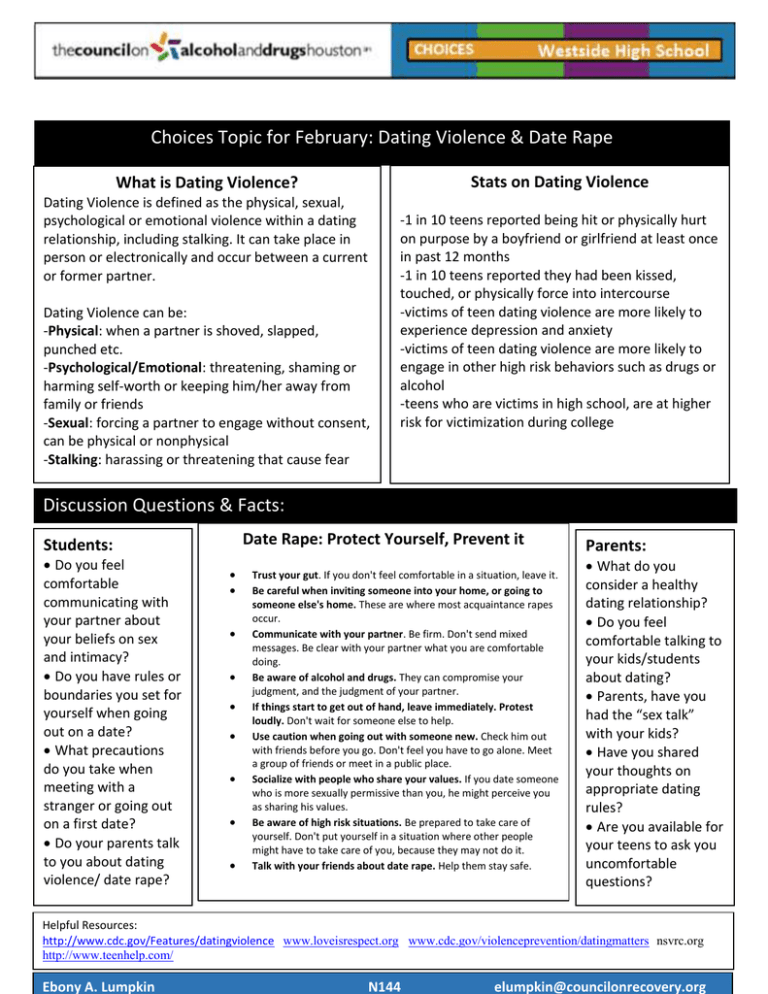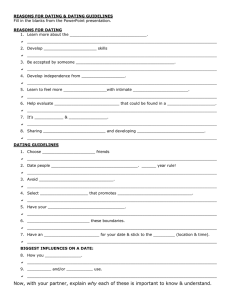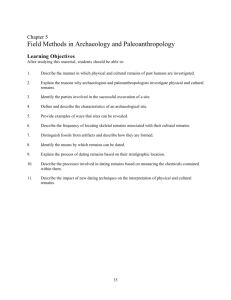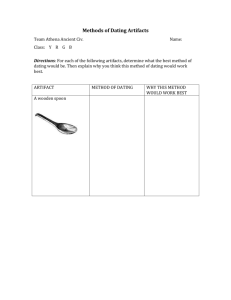
Choices Topic for February: Dating Violence & Date Rape
Stats on Dating Violence
What is Dating Violence?
Dating Violence is defined as the physical, sexual,
psychological or emotional violence within a dating
relationship, including stalking. It can take place in
person or electronically and occur between a current
or former partner.
Dating Violence can be:
-Physical: when a partner is shoved, slapped,
punched etc.
-Psychological/Emotional: threatening, shaming or
harming self-worth or keeping him/her away from
family or friends
-Sexual: forcing a partner to engage without consent,
can be physical or nonphysical
-Stalking: harassing or threatening that cause fear
-1 in 10 teens reported being hit or physically hurt
on purpose by a boyfriend or girlfriend at least once
in past 12 months
-1 in 10 teens reported they had been kissed,
touched, or physically force into intercourse
-victims of teen dating violence are more likely to
experience depression and anxiety
-victims of teen dating violence are more likely to
engage in other high risk behaviors such as drugs or
alcohol
-teens who are victims in high school, are at higher
risk for victimization during college
Discussion Questions & Facts:
Date Rape: Protect Yourself, Prevent it
Students:
Do you feel
comfortable
communicating with
your partner about
your beliefs on sex
and intimacy?
Do you have rules or
boundaries you set for
yourself when going
out on a date?
What precautions
do you take when
meeting with a
stranger or going out
on a first date?
Do your parents talk
to you about dating
violence/ date rape?
Trust your gut. If you don't feel comfortable in a situation, leave it.
Be careful when inviting someone into your home, or going to
someone else's home. These are where most acquaintance rapes
occur.
Communicate with your partner. Be firm. Don't send mixed
messages. Be clear with your partner what you are comfortable
doing.
Be aware of alcohol and drugs. They can compromise your
judgment, and the judgment of your partner.
If things start to get out of hand, leave immediately. Protest
loudly. Don't wait for someone else to help.
Use caution when going out with someone new. Check him out
with friends before you go. Don't feel you have to go alone. Meet
a group of friends or meet in a public place.
Socialize with people who share your values. If you date someone
who is more sexually permissive than you, he might perceive you
as sharing his values.
Be aware of high risk situations. Be prepared to take care of
yourself. Don't put yourself in a situation where other people
might have to take care of you, because they may not do it.
Talk with your friends about date rape. Help them stay safe.
Parents:
What do you
consider a healthy
dating relationship?
Do you feel
comfortable talking to
your kids/students
about dating?
Parents, have you
had the “sex talk”
with your kids?
Have you shared
your thoughts on
appropriate dating
rules?
Are you available for
your teens to ask you
uncomfortable
questions?
Helpful Resources:
http://www.cdc.gov/Features/datingviolence www.loveisrespect.org www.cdc.gov/violenceprevention/datingmatters nsvrc.org
http://www.teenhelp.com/
Ebony A. Lumpkin
N144
elumpkin@councilonrecovery.org




